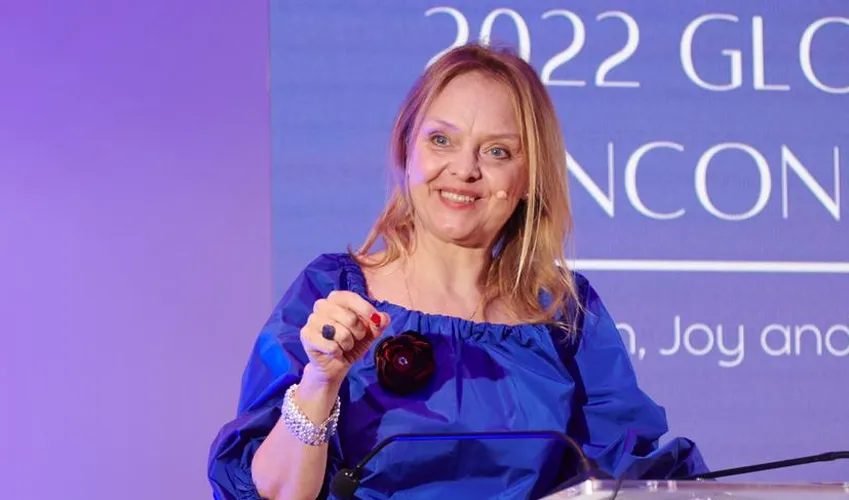
With Women, for Women
Now in its 25th year, Women's International Networking (WIN) is a leadership organization focusing on female empowerment founded by Bocconi alumna Kristin Engvig, who is CEO. WIN's flagship event is the annual Global WINConference, an internationally recognized platform for inspiring exceptional leaders, managers, and entrepreneurs that has engaged thousands of men and women worldwide.
A native of Norway, Kristin Engvig earned a Bocconi MBA in 1991 and embarked on a marketing career in the financial sector. She switched gears in 1996 and went to Europe as a Bocconi marketing trainer in the EU's PHARE program, where she was inspired to create a meeting place for women and women's networks around the world. Bringing everyone together in one place and with one unifying vision was "the fastest way I could find to advance and empower and inspire women in a compact short period of time," she says.
How did you get the idea for WIN and its mission?
Working globally made me understand the importance of community and also of inspiring another way of working, kinder and more inclusive. During my time in Milan as Professional Womens' Association president, as it was called then, I found these networks incredibly useful when I later travelled the world for work. I was inspired to bring all these groups together and meet at a conference, to strengthen each woman's authentic path, learn about new organizational approaches and create a world that is more inclusive.
You started working on female empowerment issues 25 years ago. Has there been progress? What has changed in 25 years?
When I stated, there were very few activities for women, and companies did not have diversity and inclusion programs. Women found it embarrassing to go to these events. We had to have our learning sessions mostly on weekends, Friday afternoon, Saturday and Sunday. Now it can be during the week!
The topic gets more attention now, and the vocabulary is well known to many people.
Still, I had imagined we would have seen more change over a quarter century. There is a lot of regression in the world. In the US, abortion rights were taken away. Look at Afghanistan, and Iran. The progress I see is that these regressive acts are causing women to speak up. Some of the girls in Iran are risking their lives. They won't shut up. And that is progress.
Was there a watershed event in the corporate world about diversity being recognized as an important topic? Or was change slow and gradual?
Slow and gradual. At the beginning progress was slow because people didn't know so much about it. but in a certain way it was easier because it was a novelty. Now there is a certain fatigue. That has created a bit of trouble. It can be hard to get financing. Companies say, "Kristin, I get proposals from so many different groups
What do you think of the #Me Too movement?
On the positive side, it made it possible to talk about something that for so many women was buried in shame. On the negative side, it brought forward a lot of women who have a lot of natural anger over having been treated badly. And it made some men scared. It made certain environments difficult. I have talked to men who say "I don't know what to say now. In a way I don't even want to work with women, I want to stay out of trouble." And that's not we wanted.
What are the challenges in the next 5 years? What work still needs to be done?
Now we really need to continue to awaken women to their self-worth, their connections, and their own biases about other women. Companies should continue to look at their hiring policies, how they write job descriptions, and work-life balance. Continuing to have flexible work is important. We know from statistics that many women leave at a certain point. These competitive places are too tiring. Yes, we can compete. But a lot of those cultures are made by men for men. My work at WIN is about proposing a more collaborative paradigm, which one can experience at the WINConference. We know it works.
Why do women still struggle to reach CEO positions?
It's not that women cannot lead. They can. But is there another way? Many report that although they can fit into a corporate culture, it is tiring and they wish to lead more authentically. Our work at WIN is to try to a more harmonious interaction between feminine and masculine values in the workplace.
SHOR BIO
Kristin Engvig was in the 1990 class of SDA Bocconi MBA. Bocconi has played an important role in her professional life, she says. "As an undergraduate I did business administration and I wanted to internationalize myself. Everything we studied I have used in my conferences, particularly the cross-cultural part of dealing with people from different cultures. And my Bocconi studies and network have been useful in the entire agenda design, as well as curating and directing the global and regional meetings. I later applied what I learned to my work on inspirational leadership and women's empowerment."